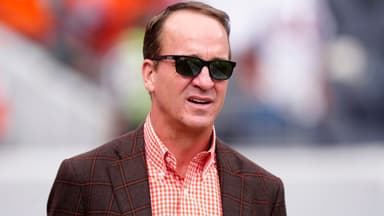Self-reflection is often regarded as one of the many keys to finding success in life. While he may no longer be a stranger to success, Tom Brady now finds himself with plenty of time to reflect following his 23-year NFL career.
Advertisement
Having won seven Super Bowls while dominating the league for the better part of the last two decades, the New England legend now finds himself sharing his advice with others in the form of a weekly newsletter. In crediting his “internal drive” for his ability to outdo his predecessors, Brady admitted to constantly chasing the ghosts of Joe Montana and Peyton Manning.
In noting that he refused to let “…the energy level and competitiveness of the opponent” dictate his own strategy, the surefire first-ballot Hall of Famer insisted that one’s tenacity and willingness to succeed must always come from within.
“I would not have been anywhere as good of a quarterback as I ended up becoming if it weren’t for my internal drive to achieve a Montana-like legacy and to meet or exceed the standard set by Peyton every drive, every game, every season for a decade-plus.”
Given that there is a plethora of hardware and All-Pro nominations attached to his resume, it’s fair to say that the results of Brady’s methods speak for themselves. Ever the motivator, the former New England Patriot also confessed that he did not always feel compelled to improve his individual status.
Instead, he chose to become a bastion of excellence. In dedicating himself to becoming the best that he could possibly be, the icon opted to critique himself on a larger scale, rather than on a per-season basis.
“In those years when we were loaded on defense or stacked at the offensive skill positions, I probably didn’t need to be better for us to win. But I never thought about getting better or achieving greatness—at a team or individual level—relative to the standings in any particular season. I thought about it compared to Joe Montana’s 49ers teams, who I idolized growing up, and Peyton Manning, who was a #1 overall pick.”
Considering that he was able to retire as the king of the QB stats page, Brady’s willingness to forgo the short term in favor of the bigger picture ultimately allowed him to unlock his full potential. A move that he wishes more would follow.
Tom Brady shares his lessons from his time in the league
With a reputation for having spent an excessive amount of hours in the film room, in addition to adhering to a diet that some believed bordered on the insane, the greatest signal caller in the history of the game firmly argued that “…greatness has to be a way of life.”
In an attempt to inspire both players and the masses as a whole, he shared that,
“Fundamentally, greatness is about doing the right things, the hard things, consistently and reliably, and doing it not just in the big game, but in every game. The next game. The last game. The game of life.”
Suggesting that limit testing is a part of life rather than an elective choice, Brady reminds us that our limits will often, if not always, push back. It is our obligation to be honest and accurate in our self-assessments before determining whether or not we have reached our true limits.
While the process may not be for everyone, it is certainly the bare minimum for those who hope to achieve some semblance of a lasting legacy. For some, the never-ending series of sacrifices and commitments may seem to come at the cost of having fun or missing out on “life” as a whole. But for Brady, it was just another season.
Where Montana was calling his wife on the sidelines, Brady was forgoing any and all ideas of personal freedom, believing that nothing was more important than the task at hand. While some may argue with his notions, they will never be able to argue with his application of them and the successes that they brought to him.
For all of the personal and familial losses that Brady has suffered in recent years as a direct result of his decision to extend his playing career, it is clear that he harbors no regrets and is content with his place atop the gridiron’s throne.







